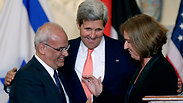
Regional approach, Arab Peace Initiative are key forward
Opening up a regional discussion track with Arab states, parallel to the bilateral peace talks, could help increase chances of a lasting peace accord.
As the United States searches for a formula to extend the Israeli-Palestinian negotiations, this is a particularly propitious moment to advance a regional architecture to the talks and, by doing so, bolster the prospects of reaching a lasting accord.
Twelve years ago this week, the Arab League adopted the Arab Peace Initiative – first introduced by Saudi Arabia – advancing the promise of normalized relations between Israel and the Arab world in the context of a comprehensive Arab-Israeli peace. Since endorsed by the 57 nations of the Organization of the Islamic Conference, the initiative is notable in its scale, scope and opportunity.
However, it remains a promise to be fulfilled upon the conclusion of a peace agreement, not an action plan for obtaining one. That should change.
Since the outset of Secretary of State John Kerry’s indefatigable Arab-Israeli diplomacy, he has sought to enlist the support of the Arab world. In April 2013, at the Secretary’s urging, the Arab League introduced the concept of minor land swaps as an amendment of the original Arab Peace Initiative, thus signaling that its terms were malleable, and that the Arab states sought a pragmatic solution. And last July, the League’s endorsement of the bilateral talks provided political cover for Palestinian Authority President Mahmoud Abbas to return to the negotiating table.
Going forward, Arab preparedness to engage Israel in mutual and reciprocal confidence building measures, alongside discussions about shared interests and a future peace, would represent a game-changing contribution to the peace process.
Both Arabs and Israelis have never had such clear incentives to work together toward a common future. The shared interests between Israel and Arab states regarding the threat posed by Iran and its proxies is no secret. Likewise, Israelis and moderate Arab nations share a concern with the proliferation of al-Qaeda affiliates in Egypt's Sinai Peninsula and throughout Syria. Meanwhile, the prospect of economic ties between Israel and the broader region, particularly with the Gulf States, is tremendous.
To seize these regional opportunities, the United States – beginning with President Obama’s visit this week to Saudi Arabia – should work with all parties to ensure that continued Israeli-Palestinian negotiations also trigger a reinvigorated regional process.
A regional discussion track, parallel to the bilateral peace talks without infringing upon them, would enhance confidence in the process among Israelis and Palestinians alike. President Abbas would have greater capacity to make decisions on issues sensitive to the broader region like refugees and Jerusalem. And for Prime Minister Netanyahu and the Israeli public, a regional track would signal the seriousness of the negotiations and the tangible benefits of an agreement.
Israelis and Arabs could start with a dialogue on the Arab Peace Initiative, proceed to discuss possible venues for economic and business cooperation, and explore solutions to shared security concerns. Smart public diplomacy would provide President Abbas critical support while convincing Israelis – the public and political leaders alike – that there is a historic opportunity in the offing. In turn, Israeli leaders could begin to prepare their own public for the important, albeit difficult, compromises that will be needed to reach an agreement, with clear regional benefits on the horizon.
In his recent speech to the American-Israel Public Affairs Committee (AIPAC), Prime Minister Benjamin Netanyahu himself lauded the potential for an Israeli-Palestinian peace agreement to “open up the possibility of establishing formal ties between Israel and leading countries in the Arab world.”
In embracing the notion of a regional peace, Netanyahu is backed strongly by the Israeli public. A recent poll commissioned by the Israel Peace Initiative Group indicated that over two-thirds of the Israeli public does not believe the Palestinians are sincere in seeking to end the conflict. Nevertheless, 75 percent of Israelis support a peace agreement within the framework of the Arab Peace Initiative, which offers the benefits of a regional peace. And, they will support the prime minister should he pursue peace in a packaged regional context that ensures the end of the Israeli-Arab conflict.
Israelis are indeed skeptical and cautious, but they are increasingly pragmatic. The concept of a regional peace is recognized as a logical strategy for advancing core interests.
Secretary Kerry clearly understands that infusing a strategic regional component into the process would provide a valuable architecture for peace talks which previous efforts have lacked. But doing so will require leadership from all parties.
We are fully aware of the challenges ahead, especially after having heard the tone of the Arab League summit this week. But if joint interests are to be advanced at this critical time for the future of the Middle East, a different regional dynamic is required.
Israel should embrace the Arab Peace Initiative for the potential that it represents, and the Arab states should prepare to become active participants in dialogue with Israelis about common interests and a future peace. When President Obama visits Saudi Arabia on Friday, he would do well to deliver that message, and to ensure that his voice is heard from Riyadh to Jerusalem.
Yuval Rabin is the co-founder of Israel Yozemet / the IPI Group. Charles R. Bronfman is the Chairman of the Advisory Council of the Israel Policy Forum.










